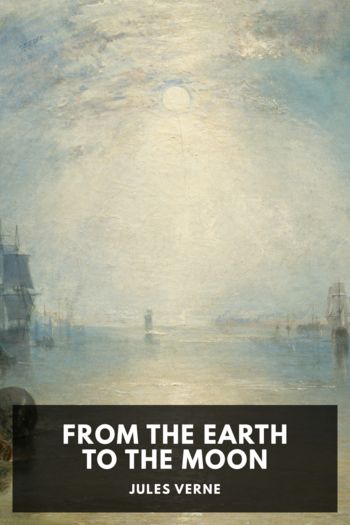Topsy-Turvy - Jules Verne (good book club books .txt) 📗

- Author: Jules Verne
Book online «Topsy-Turvy - Jules Verne (good book club books .txt) 📗». Author Jules Verne
“The same effect would obtain in the opposite section, which would contain the Indian Ocean, Australia, and a part of the Pacific Ocean, which would be thrown partly on the southern seacoasts of Australia.
“The air into which they would be thrown would be very clear; there was no doubt on that point, but it would not be dense enough for human wants.
“These in general were a part of the modifications which would take place in the two sections in which the oceans would be more or less emptied. There would undoubtedly appear new islands and mountains in such parts as the water did not entirely abandon.
“But if the diminuation of the thickness of the air did not bring enough inconveniences to those parts of the new continents raised to the high zones of the atmosphere, what was to be the case of those parts which the erruption of waters put below the surface? We may still breathe under the diminished pressure of air below the atmospheric pressure. On the contrary, under a very few inches of water we cannot breathe at all, and this was the condition in which the other two sections found themselves. In the section northwest of Kilimanjaro the maximum point would be at Yakoutsk, in Siberia.
“From this city submerged 8.415 metres under the water, less its present actual altitude, the liquid mass, decreasing, would extend to the neutral lines, drowning the greater part of Asiatic Russia and of India, of China, of Japan, and of American Alaska, to the Behring Sea. In regard to St. Petersburg and Moscow on one side, and Calcutta, Bangkok, Saigon, Peking, Hong Kong and Yeddo on the other side, these cities would disappear under a cover of water sufficient to drown all Russians, Hindus, Siamese, Cochin Chinese, Chinese and Japanese, if they did not have time to emigrate before the catastrophe.
“In the section southeast of Kilimanjaro the disasters would be equally marked. This section is in a great part covered by the Atlantic and Pacific oceans, the level of which would raise 8.415 metres at the Archipelagos of the Azores. All this vast area would disappear under this artificial deluge, among others the angle of Southern Africa from Guinea and Kilimanjaro to the Cape of Good Hope, and the triangle of South America formed by Peru, Central Brazil, Chili, and the Argentine Republic, as far as Terra del Fuego and Cape Horn. The Patagonians, high as they are located, would not escape this immersion, and would not even have opportunity of taking refuge on that part of the Andes, as the highest points of that range would not be visible at all in this part of the globe.
“This, then, must be the result, the lowering of the upper and raising of the lower sections, and an entirely new surface to the oceans, produced by the corruscations in the surface of the earth’s sphere. Such were the happenings which would result, and against which the people of this world had no help if they could not prompdy stop Barbicane & Co. in their criminal attempt.”
In Which a Crowd of Dissatisfied People Break Into the Cell of J. T. MastonAfter this public notice there was nothing left but to wait for the coming danger or to run away to the neutral lines, where there would be no danger. The threatened people were, in general, divided into two classes—“the people who would be suffocated and those who would be drowned.” This communication roused many different suggestions, which, however, all turned into the strongest and most violent protestations against the schemer and schemers. Among those who would suffocate were the Americans in the United States, the Europeans of France, England, Spain, etc. Even the prospect of annexing territories now at the bottom of the ocean was not sufficient to make them quietly accept these changes. Paris, carried towards the new pole a distance about equal to that which separates it now from the old one, would gain nothing by it. It would have a continued Spring, it is true, but it would lose considerable air. And this was not satisfactory to the Parisians, who like to have as much air as possible, and boulevard property and cafés went begging. Among those who would be drowned were the inhabitants of South America, of Australia, Canada, India, Zealand, etc. Great Britain would suffer the loss of her richest colonies, which Barbicane & Co. would take away from her through their operation. Evidently the Gulf of Mexico would constitute a vast kingdom of the Antilles, of which the Yankees and Mexicans could claim possession by the principles of the Monroe doctrine. The islands of the Philippines, Celebes and the water around them would leave vast territories of which the English and Spanish people could take possession. It is a vain compensation. It did not at all balance the loss due to the terrible flood.
If under the new oceans only Samoyedens, Lapons of Siberia, Feugans, Patogonians—even Tartars, Chinese, Japanese, or a few Argentines—would suffer and be lost, perhaps the civilized powers would have accepted this sacrifice complacently. But too many powers took part in the great catastrophe not to raise a torrent of protest.
And what especially concerned Europe was, that although the central part of it would be nearly intact, it would be raised in the west and lowered in the east, half suffocated on one side and half drowned on the other. This was not very acceptable. The Mediterranean Sea would be almost emptied, and this would not be very agreeable to the Frenchmen, Italians, Spaniards, Greeks, Turks, and Egyptians, who by their





Comments (0)